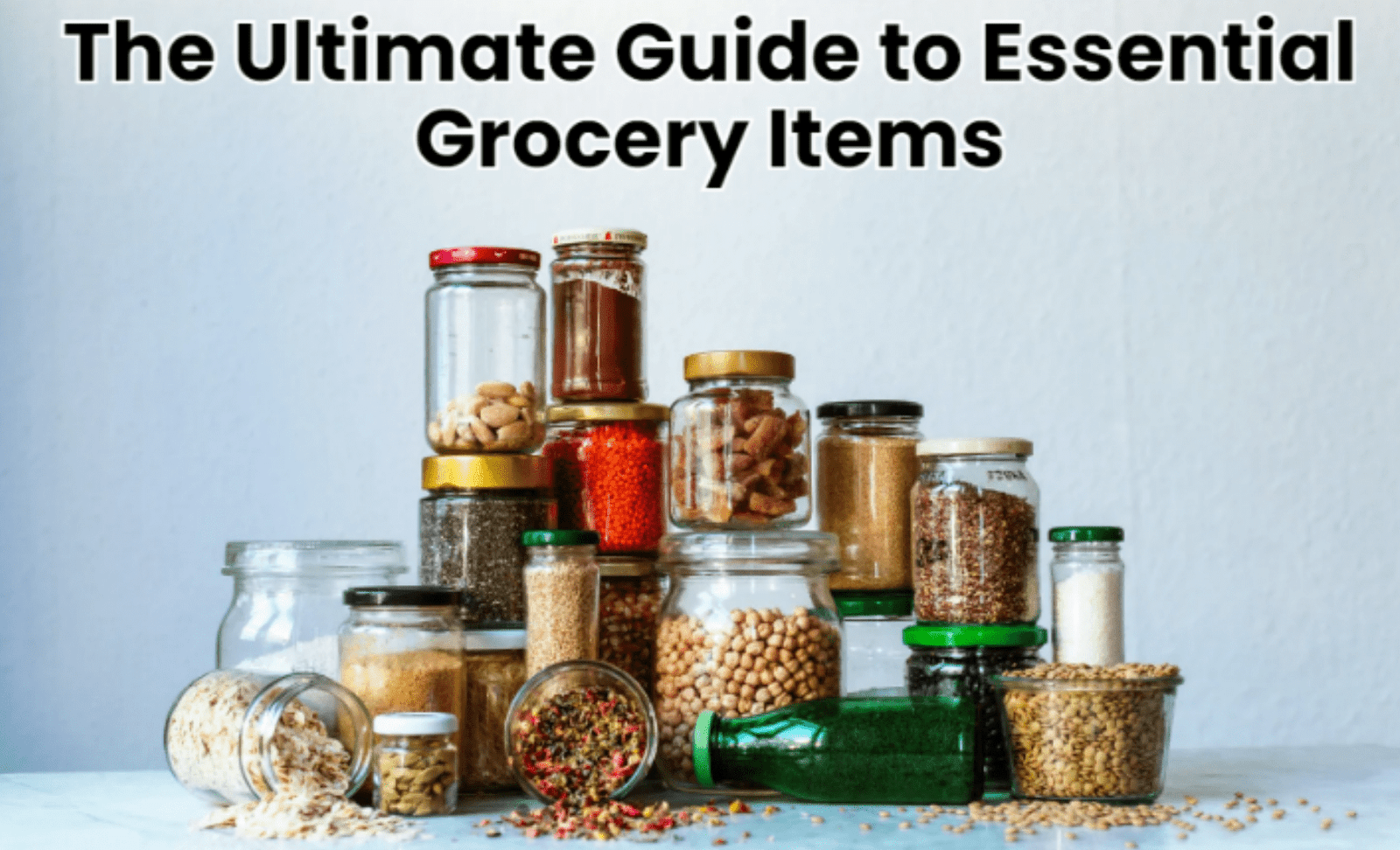Source: Canva
Do you ever walk into those grocery stores and be like, “Okay, what am I supposed to have in my pantry and fridge, anyway?” There are honestly just so many products out there these days that it’s hard to know which staples are supposed to be kept in a stocked kitchen.
Whether one is a busy working professional, a parent managing a household, or simply one beginning to get by on their own, knowing what groceries a person needs can expedite their trips to the store and keep them on a healthy track.
The following ultimate guide will walk you through the must-have grocery items to grace every shopping list, equipping you with practical tips for making your grocery shopping more efficient and effective.
The Foundation of a Well-Stocked Pantry
A well-stocked pantry starts with some basic grains and cereals. Basic rice comes in white and brown, the latter being quite versatile in its applications from stir-fries to casseroles. Pasta is another ‘must-have’; it can be stored in so many shapes: spaghetti, penne, and macaroni, among others.
Skokie, IL, a suburb of Chicago, is known for its diverse community and vibrant local culture, which extends to its kosher grocery offerings. In Skokie, you’ll find a variety of kosher grocery stores that cater to both traditional and contemporary dietary needs.
These stores often provide a wide selection of kosher-certified products, ranging from essential pantry items to specialty goods, ensuring that residents have access to high-quality, compliant ingredients.
With that, kosher grocery stores in skokie, il offer a range of products that can kick-start many meals. Oats, for example, can be used at breakfast or in baked goods, from oatmeal and granola to as a binding ingredient in various recipes. Their versatility makes them a useful component in any kosher kitchen, providing a solid base for preparing a variety of nutritious and flavorful meals.
Canned Items
Canned and jarred items are pantry staples for convenience and shelf life. Canned tomatoes are whole, diced, or crushed and ready for sauces, soups, and stews. Beans are a great source of protein and fiber. There is a variety of types that range from black beans to chickpeas, to kidney beans, that work very well in salads, soups, and chilies.
Other products that come under this group are broths and stocks, which give flavor depth to soups, stews, and sauces. Salt intake in the recipe can be controlled by using its low-sodium version.
Baking Needs
Baking needs are basic in bringing sweet or savory baked treats. All-purpose flour is good to go for bread, cakes, and cookies. Granulated and brown sugar is highly important to sweeten the recipes. Powdered sugar also gives so much help for icing and decoration. Baking powder and baking soda help the baked goods rise, providing leavening for the baked items.
The Heart of a Well-Stocked Fridge
One of the staples of a healthy diet, dairy products play many different functions in recipes. Milk is available to use in whole, skimmed, or plant-based forms according to preference drink, cook, and bake with.
Plain cheeses such as cheddar, mozzarella, and Parmesan cheeses make up the backbone of most recipes for flavor and texture. Plain yogurt is a healthy snack or even a quick breakfast that also has uses in cooking and baking.
Other than balance, proteins need to be part of your refrigerator. Eggs can be quite versatile for breakfast dishes, and baking, and also a source of protein in many dishes. Stock your refrigerator with a variety of meats such as chicken breasts, ground beef, fish, and many other types for dishes ranging from stir-fries to roasts. For vegetarians who avoid animal-derived products, tofu is a fairly good source of protein in many courses.
Fresh produce is one of the most important categories when considering healthy eating. The greens, including spinach, kale, and lettuce, are great for salads or even sautéing in foods. Other vegetables like carrots and bell peppers can be used in salads, stir-fries, or as snacks on their own.
Apples are a good snack on the go, while citrus fruits like oranges and lemons add tons of zest to dishes, not to mention vitamins. The note should be such that it catches the attention of each fruit vendor that happens upon this list.
Essential Condiments and Spices
Condiments add flavor and a bit of excitement to food. Olive oil is a base oil for sautéing, and a base for salad dressings adds that healthy fat influence. Soy sauce is convenient not only for stir-fries but for marinades.
Both soy sauce and Worcestershire sauce add umami flavor to foods. Balsamic, apple cider, and white are the vinegar needed to make the dressings and for the quick processes of pickling.
Spices and herbs are what give flavor to your meal. Salt and pepper are the simple seasonings you use in almost everything. Garlic powder and onion powder give flavor to food items when fresh ones are not needed. Basil, oregano, and thyme are dried herbs that find their fit in various recipes.
Practical Tips for Efficient Grocery Shopping
One of the best things one could do to streamline the grocery shopping process involves making a list. Project meals for the week, then create a shopping list to ensure getting all of the items. This will also keep you from making impulse purchases and forgetting critical ingredients.
Periodic checking of the expiry dates for items in your pantry and replacing those items that have passed their expiry dates will keep usable and safe food in storage. Taking advantage of the on-sale items and buying non-perishable items in bulk saves money and builds stock for important items.
This means that you may be able to keep the things in the kitchen, keeping your pantries and refrigerators organized so you may be able to source out anything from them more easily and thus minimize the waste of food. Food must be stored in a clear, labeled container so that everything is organized and can be seen and found for your meals.
Best Ways to Organize Your Pantry and Fridge
| Method | Description | Benefits |
| Use Clear Containers | Store pantry and fridge items in clear, airtight containers. | Easy to see contents, reduces food waste, and keeps items fresh longer. |
| Label Everything | Label containers, shelves, and bins with their contents and expiration dates. | Quickly find what you need, manage inventory better, and avoid confusion. |
| Categorize Items | Group similar items together, such as grains, canned goods, snacks, and condiments. | Streamlines the shopping and cooking process, making it easier to locate and use items. |
Conclusion
Having these grocery essentials in your pantry and fridge will make meal preparation easier, knowing that you are always ready for a delicious and healthy meal.
Also, note the multipurpose staples, high-value dairy and proteins, and fresh produce, along with essential condiments and spices to help you strike a balance in your diet and make grocery shopping less tedious and time-consuming. This complete guide to grocery essentials brings you halfway to a well-planned kitchen, in anticipation of your needs and tastes in food.
FAQs
- What are the most important pantry staples?
Key pantry staples include rice, pasta, oats, canned tomatoes, beans, and basic baking ingredients like flour and sugar.
- How can I ensure I always have fresh produce?
Regularly stock up on versatile vegetables like carrots and bell peppers, and fruits such as apples and citrus fruits. Keep an eye on expiry dates and rotate items as needed.
- What dairy products should I keep on hand?
Essential dairy products include milk (or a plant-based alternative), cheese (cheddar, mozzarella, Parmesan), and plain yogurt.










